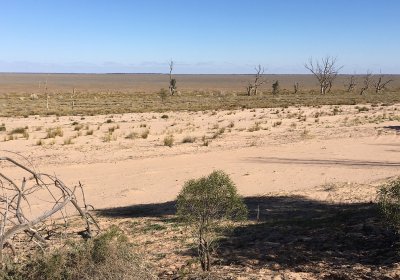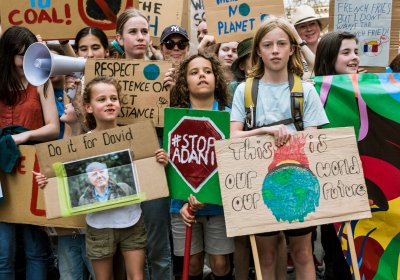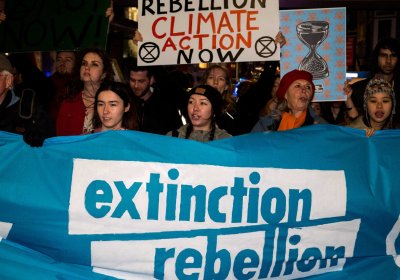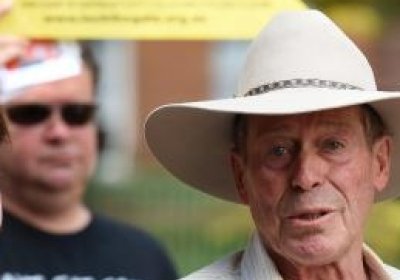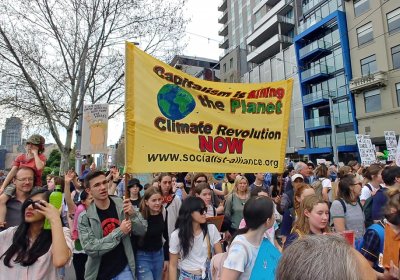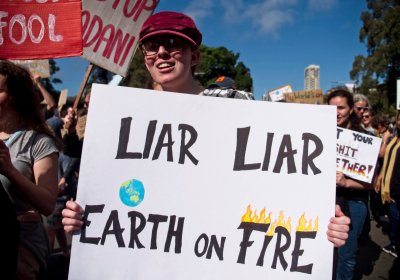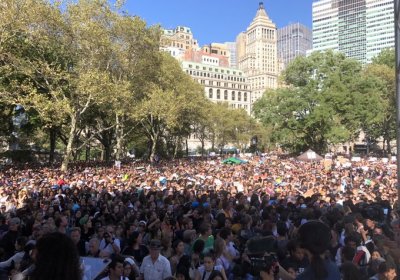For the first time in Australia, a house of state parliament has voted to declare a climate emergency.
Issue 1239
News
More than 200 people are set to tour north-western New South Wales to bear witness to some of the state’s driest rivers and bring back solutions for the water crisis affecting local communities. The tour has been organised by Muruwari and Budjiti man Bruce Shillingsworth who spoke to Green Left Weekly’s Rachel Evans about its purpose and aims.
Resources minister Matt Canavan jetted off to India last month to continuing the unedifying Australian government tradition of flogging the nation’s dirtiest minerals to the places that least need them, documents obtained by the Australian Conservation Foundation (ACF) have revealed.
“The student strikes have been phenomenal — surreal at times,” Sydney high school student Chloe Russell-Alexander told Green Left Weekly reflecting on the huge Climate Strike that saw more than 300,000 people walk out of school or work across Australia on September 20. “That reflects education, cooperation and social cohesion on a massive scale. It means that we mean business.”
Some more great photos from Melbourne's amazing Climate Strike protest, where 100,000 took to the streets on September 20 to demand real and immediate action to confront the climate crisis.
See also: Will the huge student-led Climate Strike be a game changer?
Photos: Mel Kulinski
The following open letter, signed by more than 250 academics at Australian universities, was released on September 20.
Regarding the Land Court's 2017 recommendation to refuse the Stage 3 expansion of the New Acland coal mine, Queensland's Court of Appeal decided on September 10 that it does not have the power to consider groundwater quantity impacts when hearing mining objections.
Analysis
No one ever wishes to witness a 17-year-old boy impaled on an iron fence. “A freak accident,” the coroner declared, exempting NSW police who denied chasing TJ Hickey in 2004.
People from across the nation are heading up to the Galilee Basin in Central Queensland to put themselves on the line to stop Adani’s coal mine going ahead. Green Left Weekly’s Coral Wynter has just returned from a week at the Frontline Action on Coal (FLAC) protest camp.
The federal Coalition government’s reforms to private health insurance confirm its blind allegiance to a system most people do not support.
Most people prefer a universal public healthcare system, but ever since Medicare was introduced in 1984, successive governments have sought to divert public funds to the private health insurance sector.
The government spends about $6 billion annually on private health insurance rebates. Singles earning up to $140,000 and families earning up to $180,000 receive rebates of between 8.4% and 33.4%, depending on age and income.
Prime Minister Scott Morrison has announced yet another inquiry into the family law system, with Liberal MP Kevin Andrews and One Nation Senator Pauline Hanson as leader and deputy chair, respectively. Neither are known for supporting the Family Court nor their expertise in family violence issues, writes Sue Reilly.
The global Climate Strike was the largest climate protest in history — and could turn out to be a tipping point for radical action on climate change, writes Jim McIlroy.
A sophisticated greenwashing industry has emerged over the past few decades to not just mask the environmental destruction of corporations while blaming consumers, but to also present the climate crisis as a neutral and natural disaster, disconnected from a system of inequality. In fact, the climate crisis shows the wrong people are running the world, writes Tamara Pearson.
350.org co-founder Bill McKibben estimates that on September 20, about 4 million people took part in roughly 2500 Climate Strikes in more than 163 countries on seven continents. That is a phenomenal success for an emerging school student-led protest movement that only started last year.
We need to thank School Strike 4 Climate for being realistic by demanding the impossible, says Socialist Alliance Fremantle councillor Sam Wainwright.
The following speech was given by Barathan Vidhyapathy, from the Tamil Refugee Council, outside the Federal Court hearing into the fate of the Tamil family of Priya and Nades and their two Australian-born daughters, in Melbourne on September 19.
The family, who had lived in Biloela, Queensland, for four years before they were put in a Melbourne immigration detention centre in March last year, is being threatened with deportation to Sri Lanka.
World
Spain’s acting Prime Minister Pedro Sánchez, leader of the Spanish Socialist Workers’ Party (PSOE) and winner of the April 28 general election, informed King Philip on September 17 that he lacked the support to form a government. As a result, another general election will be held on November 10.
Capitalism has locked us into a logic that is forcing humanity to participate in its own spectacular self-annihilation, writes Ammar Ali Jan.
I had no idea that September 20 would be so huge. Greta Thunberg said to a reporter as she marched in New York: “I would never have predicted this.”
It was just over a year ago that Thunberg, now 16 years old, began skipping school every Friday to protest in front of the Swedish parliament, demanding action to prevent catastrophic climate change.
Australian anti-fascist campaigner Jock Palfreeman’s parole is being challenged by Bulgarian authorities and his lawyer has said he urgently needs to leave the country.
A new report shows why Tamil refugees fear being sent back to Sri Lanka, and why it is essential to campaign against the Australian government's policy of deporting them or pressuring them to return "voluntarily", writes Chris Slee.
Timor-Leste joined the global climate strike for the first time, on September 24.
More than 400 people took part in the climate strike in the capital, Dili. The protest stared from the Palacio Governo, marching to Bidau for speeches and a concert.
In 2012, the newly formed Kurdish self-defence forces took control of the town of Kobanê from the Assad regime’s forces.
Despite all the immense challenges facing it, the revolution has survived. It has provided tremendous inspiration to people around the world. It thus has a global meaning and relevance.
Dr Pavin Chachavalpongpun, an associate professor at the Centre for Southeast Asian Studies at Kyoto University, has since 2014 been branded an 'enemy of the state' by Thai authorities. He spoke to Green Left Weekly's Peter Boyle.
Members of the United Auto Workers (UAW) 722 on the 5th day of their strike and picket outside the General Motors (GM) Parts Distribution Center in Hudson, Wisconsin on September 20.
49,000 UAW members are taking their first national strike in decades, hoping to win a pattern-setting contract, which will set the standard for negotiations with other car makers.
While unionised Teamster truck drivers have refused to cross the picket line, strikers at parts distribution centres face off with non-union transport companies.
Zimbabwe’s former president Robert Mugabe is remembered for many things, including the successful struggle for black majority rule in the former Rhodesia. But his brutality against minorities and his manipulation of the desire for land led to one of Africa's richest countries becoming impoverished, writes Alan Broughton.
Culture
Mat Ward takes a look at 10 new albums with something to say on politics and struggle around the world.
Women’s health and chronic pain has been ignored throughout medical history, writes Gabrielle Jackson. Pain, and more specifically, pelvic pain has been seen as an intrinsic part of womanhood.
This book is effectively a sequel to Jon Ronson’s The Men Who Stare at Goats, which inspired an hilarious film of the same name. That book exposed the US military's serious experimentation with all sorts of weird and whacky, New Age, mind-altering techniques to produce better killers.
Denis Diderot is now remembered, if at all, only as the name of a Metro railway station in an unfashionable neighbourhood of Paris.
In his day, however, the 18th century Enlightenment philosopher was quite the subversive intellectual who parted the ideological fog of religious, moral and political backwardness for a view of the sunnier uplands of today’s society, writes Phil Shannon.

